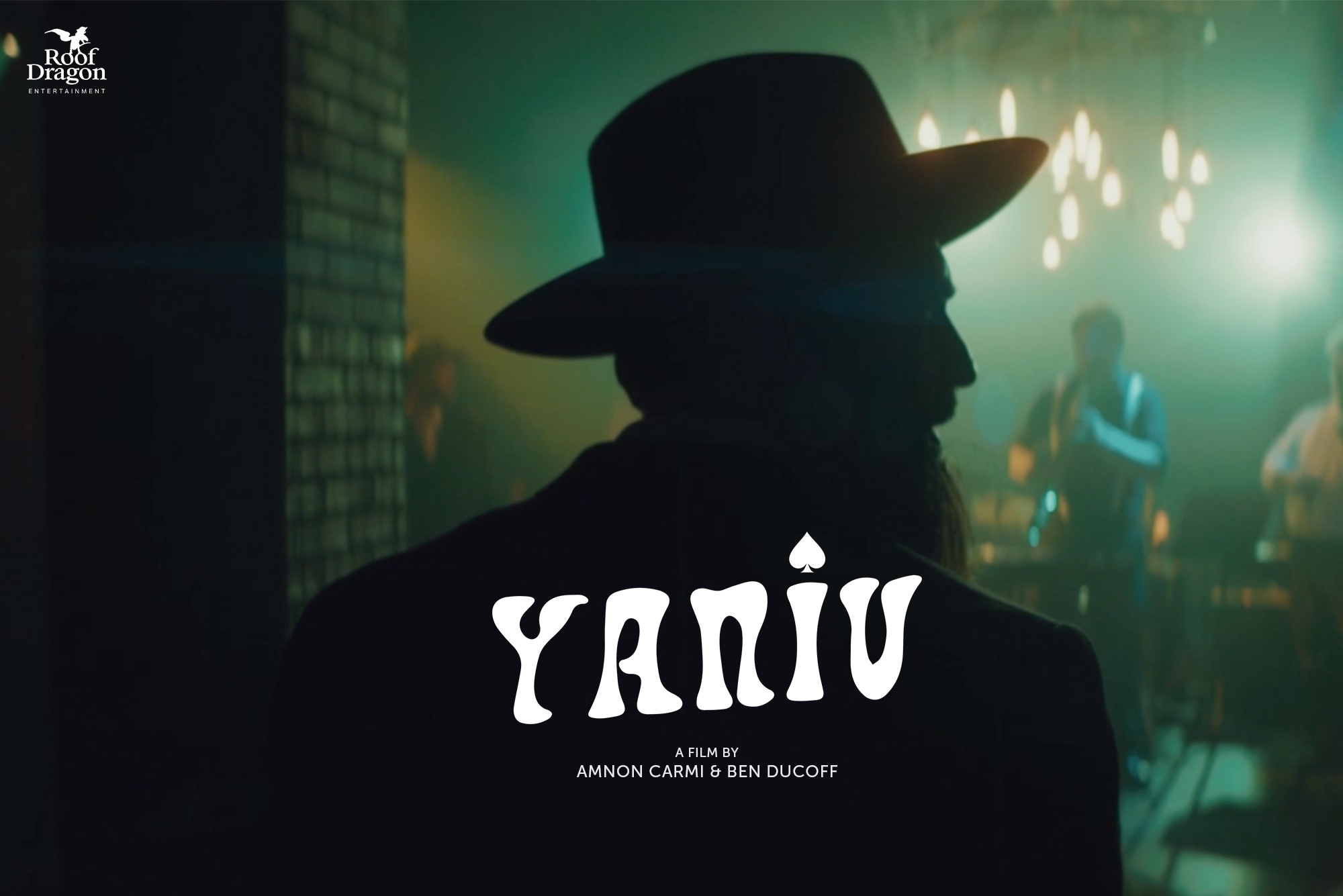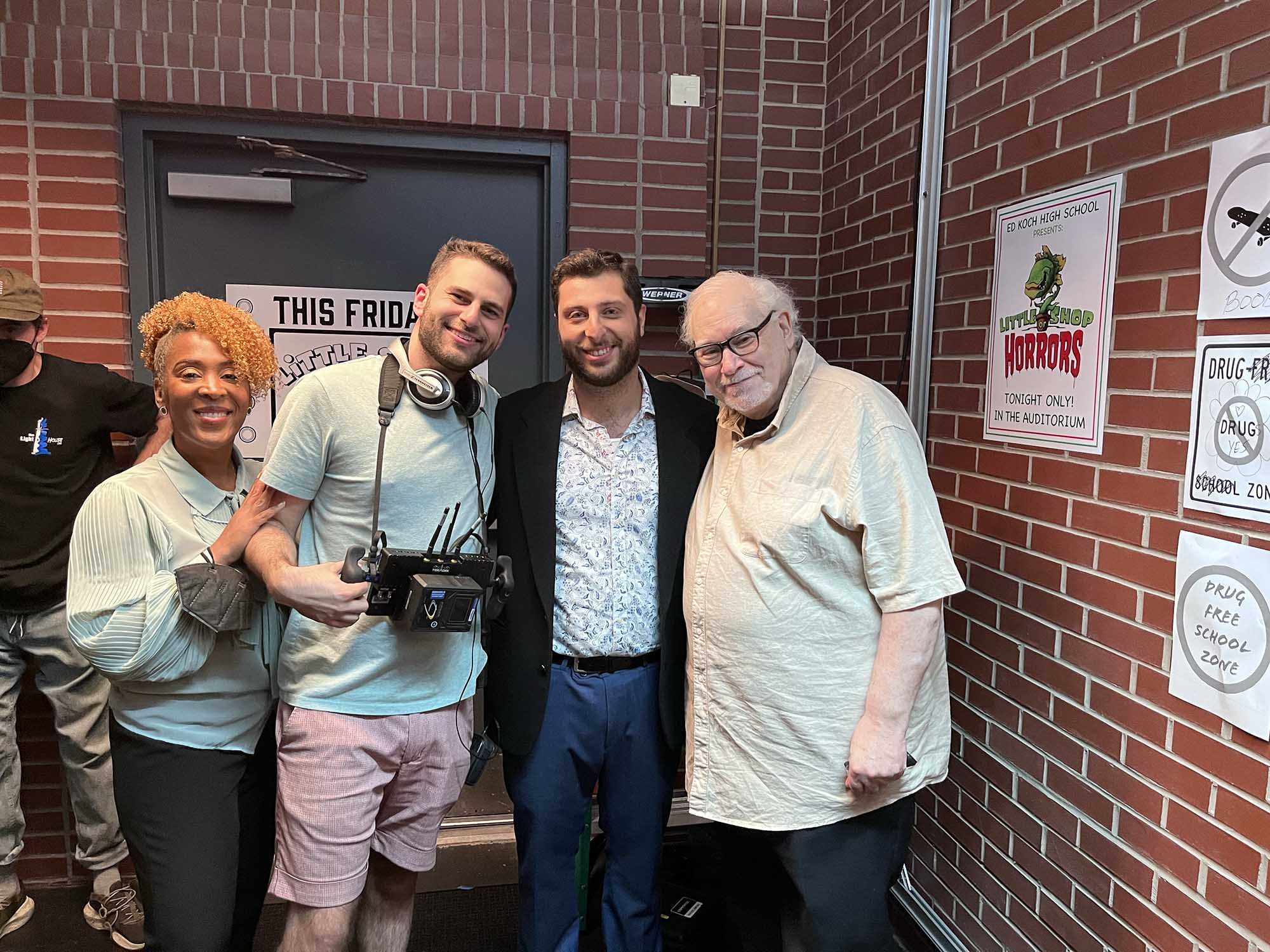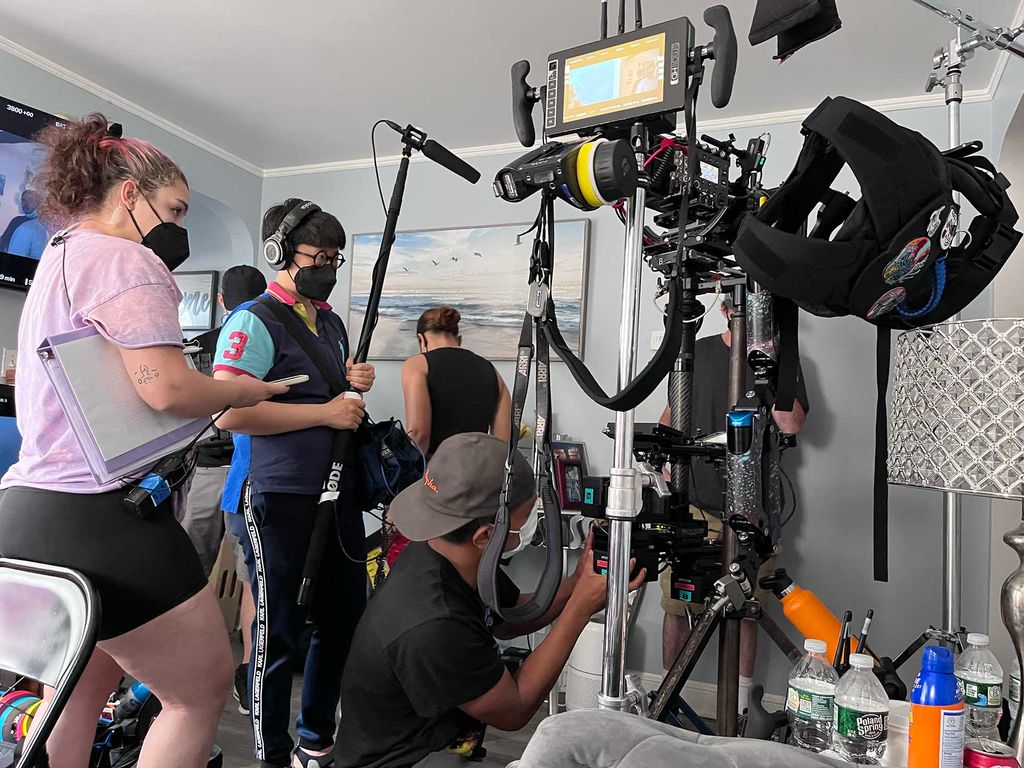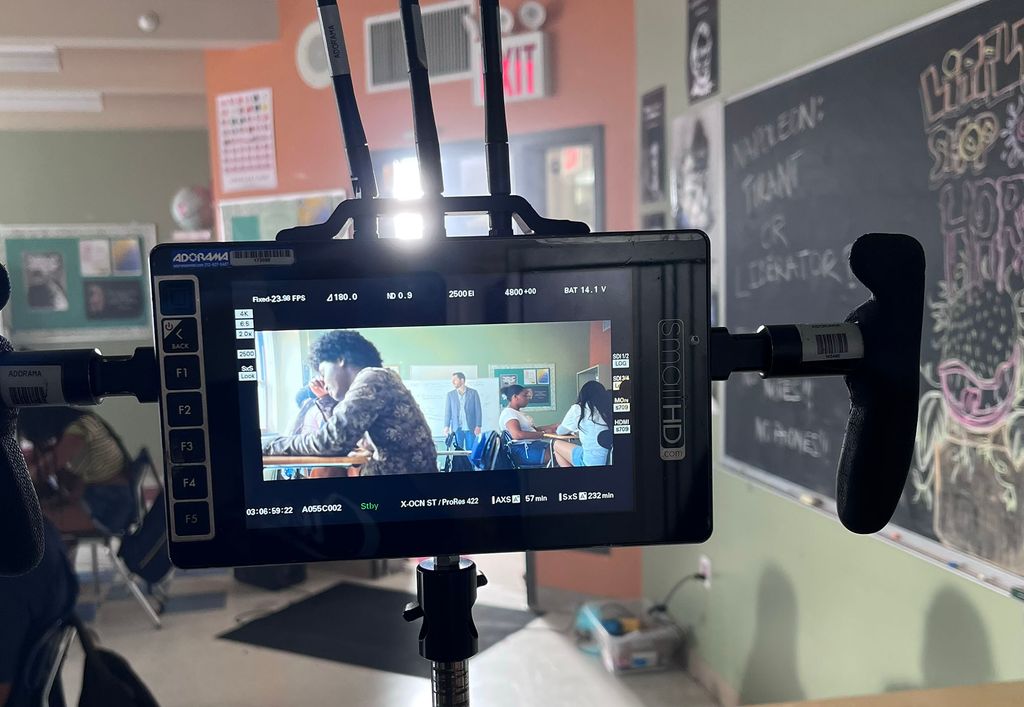Real-Life Teacher and CFA Alum Ben Ducoff Plays a Teacher in Yaniv, His Debut Feature Film
Dark comedy follows a fictional high school teacher who infiltrates an underground Israeli card game run by Hasidic Jews

Yaniv’s main poster
Real-Life Teacher and CFA Alum Ben Ducoff Plays a Teacher in Yaniv, His Debut Feature Film
Dark comedy follows a fictional high school teacher who infiltrates an underground Israeli card game run by Hasidic Jews
What do a New York public high school, an Israeli card game, and a school musical have in common? The creative mind of New York City–based filmmaker and producer Ben Ducoff.
Ducoff (CFA’15), who studied theater at Boston University, blends these three themes in Yaniv, his first feature film.
Ducoff developed the idea with his best friend, Amnon Carmi, who directs the film; four other CFA alums worked in various roles in front of, and behind, the camera. Yaniv, part comedy, part drama, follows Barry Bernstein, a high school teacher in the Bronx—played by Ducoff—whose school is facing budget cuts to its arts curriculum. To scrape together the money needed to stage the school’s spring musical, Bernstein infiltrates an underground community of Hasidic Jews playing Yaniv, an Israeli card game. With his best friend and fellow teacher in tow, he tries to cheat the game; chaos, comedy, and adventure ensue.

When Bostonia spoke with Ducoff, the SAG-AFTRA (Screen Actors Guild–American Federation of Television and Radio Artists) strike was in full swing, which severely curtailed actors’ ability to promote their upcoming films. Fortunately, Ducoff received an interim agreement from the actors union and was able to tell us how he came up with the idea for the film, what the titular card game entails, and the challenges he faced making his first feature film.
Q&A
with Ben Ducoff
Bostonia: How did you get the idea for Yaniv?
Ducoff: The film is partially based off of my experience teaching in the South Bronx. I still work for the department of education—that’s my day job. During the pandemic, we [Carmi and I] were bouncing ideas off of each other, like, what would be a good story?
We grew up playing this Israeli card game, Yaniv, and we always would joke that it would be a great game in a casino. And then it was, like, boom: what if there’s this teacher who’s got to raise money for the school musical, so he infiltrates the underground game? The whole world kind of unraveled from there.
Bostonia: Tell us more about the film’s storyline.
Ducoff: The film is about a high school teacher in the Bronx who runs the drama club. All the arts funding gets cut that year and he can’t do the spring musical, so [to raise money] he decides to infiltrate an underground card game run by Orthodox Jews. It’s a game that he learned from his grandfather, who lets him know there is a place you can play for money if you so choose. He ends up recruiting his best friend at work, who’s the statistics teacher and a recovering gambling addict, and he dresses his friend up as an Orthodox Jew and they go in and basically cheat at this game. Then they get caught and it all unravels—but there’s a happy ending.
Bostonia: How do you play Yaniv? What does the card game entail?
Ducoff: The goal of Yaniv is to get your hand down to seven or less. We actually made a video that explains how to play it. You go around, put down a card and pick a card up, and the goal is, like, through doubles, triples, flushes or whatever else, you get your hand down to under seven. So it’s really fast-paced and requires some strategy.
I think Yaniv came to Israel via Nepal. A lot of Israeli soldiers would travel the world after they finished their army service and go to Nepal. This game became very popular among people traveling, and they brought it back to Israel and it made its way to Jewish summer camps. What’s cool is that if I meet an Israeli or an American Jew, I can be, like, “Do you know how to play?” and for the most part it will be a yes. It brings people together in that way.
Bostonia: Is there really an underground Yaniv scene in New York City?
Ducoff: That’s a really good question. That’s something we always get, that people always ask us. We neither confirm nor deny it.

Preparing to shoot a scene for the film.

A classroom scene being filmed.
Preparing to shoot a scene for the film (left). A classroom scene being filmed (right).
Bostonia: Who were the other CFA alums involved in the film, and what was it like working with them?
Nik Sadhnani (CFA’15) produced the movie with me and also has a supporting role in it, as a rude party guest. Annabelle Steven (CFA’16) plays one of the female leads, Deb, a new teacher at Ed Koch High School, and Ben Salus (CFA’16) plays Rick, a soon-to-be groom, whose bachelor party leads to disaster. We also had Ian Geers (CFA’14), who helped out behind the camera and played background characters in several scenes.
Annabelle and I were in the same class at BU and had done a play together. So, acting with someone you already have rapport with is just great. It was the same thing with Nik. I felt like we all spoke the same language. We’d come out of the same training program, and we knew how to make things happen together. So when I was finally ready to produce the feature—these are my closest friends from school and we know how to create together—it made sense to bring them on board. It paid off really well.
Bostonia: The film also involved a partnership with the New York Department of Education. Can you talk about that?
I teach at a school called Hero High School, and this filmmaking program came out of a partnership with the New York Department of Youth and Community Development. They basically offer paid internship programs, where they place students at work sites and pay their wages.
There were about 10 students from the program who came to work on the set when we were filming in New York, and they were dispersed across departments. They were working in the art department, doing hair and makeup, and assisting the camera department, while others were holding the boom mic. They were really instrumental with the art department, because it was the middle of the summer, but we were filming in a school and had to make it seem like the middle of the school year. So these kids made fake homework assignments, fake student council posters, and fake extracurriculars. Some of them were even in the movie, and they recruited kids in the neighborhood who came in and played students as well. And the kids that had lines could get their SAG eligibility.
One student, who was graduating, got a job offer to be first assistant director for a project. So, we saw students going from our program and just getting a foot in the door in the industry. It was incredible.
Bostonia: What was it like having kids on set?
It was both really beautiful and really stressful. The students loved it. There were some times where they were all supposed to leave by 6 pm, but they would try hard to stay there and hide. We were doing a rooftop scene, and we weren’t even going to start filming until midnight. The students were supposed to be out of there by sunset, but I walked up on the roof and they were still there. I was like, “Oh my god, you have got to go home. It’s, like, one am in Brooklyn, you cannot be here.”
But it was really cool to see them working with people in the industry, like Catherine Curtin [executive producer for Stranger Things and Orange Is the New Black], who plays the school principal in the film.
Bostonia: How has the Jewish community reacted to Yaniv?
I mean, first of all, we had some Orthodox Jews working on the film with us. We also had rabbinical and Yiddish consultants. It was really important to us that we not lean into any stereotypes. What we wanted to do was tell a story about modern Jewish life. We’ve also been accepted into a number of Jewish film festivals. So, this is a movie that is our own strange, bizarre love letter to the Jewish community.
This is a movie that is our own strange, bizarre love letter to the Jewish community.
Bostonia: Did you encounter challenges while making the film?
Tons. The film almost didn’t happen maybe seven times. Even though we had the support from the school district and this program set up, we lost our permit to film in the school building maybe a week before production. Luckily, we found a charter school in Brooklyn that took us in. There was also a bad COVID strain going around and pretty much everyone got it, so we were down people. We were worried we were going to have to shut down. I mean, pretty much every day there were all these fires to put out. But we got through each one.
Bostonia: What kept you motivated?
I always felt like I had the pieces. We had the script, we had the building blocks, my principal was able to get me a bunch of equipment, and I had the studio. And I was going to be okay making the film even if we had no money. I was going to find a way to do it.
That’s the other great thing about working with peers from BU: they always believed in me. I had a really good team of people that could divide and conquer really well. You know, if I had a day where I didn’t get what I needed to get done or I didn’t raise enough money, one of them would say, “Well, I got this,” and we could all go to bed feeling like we’d done something. Eventually, we had momentum, and then, out of nowhere, the cameras were rolling.
Bostonia: After a couple of previous live screenings, you’ll screen Yaniv for a live audience this Saturday at West Newton Cinema. What have audiences told you?
They’ve found it to be really funny and quirky. They’ve described it as heartwarming, engaging, wacky. It’s a bizarre feeling to watch the film with a live audience. Having been so deeply involved in it from start to finish, knowing the things that didn’t turn out the way they were supposed to, it’s hard to relax while watching the film as an audience member, but it’s very gratifying to see others watching it and enjoying it.
The whole process has been a dream come true. As a kid, I could never imagine this happening, but it is—and it’s thrilling.
Yaniv will screen at the West Newton Cinema, 1296 Washington St., Newton, Mass., on Saturday, November 4, at 7:30 pm. The screening will be followed by a Q&A with Ben Ducoff and Amnon Carmi. Purchase tickets here. View a trailer for the film here.
Comments & Discussion
Boston University moderates comments to facilitate an informed, substantive, civil conversation. Abusive, profane, self-promotional, misleading, incoherent or off-topic comments will be rejected. Moderators are staffed during regular business hours (EST) and can only accept comments written in English. Statistics or facts must include a citation or a link to the citation.